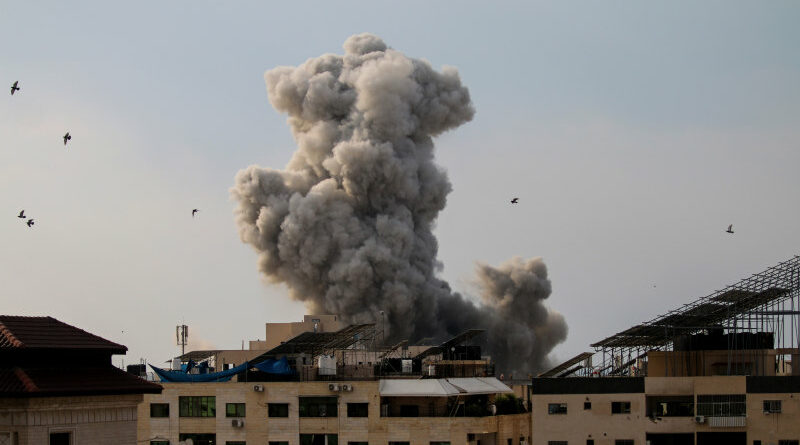‘National shock’: Israeli army mobilises, Hamas threatens hostages
Save articles for later
Add articles to your saved list and come back to them any time.
Hamas has threatened to execute one captive for every Israeli attack on Gaza civilians that lands without warning, marking an extraordinary escalation that threatens the lives of at least 130 hostages from Israel and around the world.
The militant group’s armed wing spokesman Abu Ubaida issued the warning in audio released late on Monday night, linking it to Israel’s increased aerial strike campaign, Reuters reported.
Smoke rises after an Israeli bombardment on Gaza City, Gaza.Credit: Getty
Israeli Foreign Minister Eli Cohen warned Hamas against harming any of the hostages, saying, “This war crime will not be forgiven.”
Gaza entered a new state of siege after Israel ordered immediate cuts to electricity, food and water supplies and escalated a relentless aerial bombardment that left the troubled enclave burning as the sun set on Monday.
Israel has amassed 100,000 Israeli troops plus tanks and armoured personnel carriers near the border with Gaza, stoking speculation of a full-scale ground invasion in retaliation for the attacks and hostage takings waged by the Hamas militant group.
Three days after the unprecedented Hamas assault, Israel has launched the largest army mobilisation in its history: on top of 170,000 active soldiers, the defence force has called up 300,000 reservists.
An injured man as a result of Israeli airstrikes in Gaza City, Gaza. Credit: Getty
At least one airline has added new flights to bring overseas reservists home to serve.
Late Monday evening (AEDT) Israeli military said it had re-established sovereign control of its southern towns where it had been battling Hamas gunmen, however the desperate search for at least 130 hostages taken across the border to Gaza remains ongoing.
The death toll in Israel has surged to 900, of which the overwhelming majority are civilians. At least 560 Palestinians are confirmed dead and 3000 have been wounded since Israel launched its retaliatory aerial campaign.
During one three-hour period on Monday night, Israeli fighter jets made 130 air strikes on Gaza.
Palestinian citizens inspect damage to their homes caused by Israeli airstrikes in Gaza.Credit: Getty
Speaking to mayors of southern towns overcome by the Hamas assault, Prime Minister Benjamin Netanyahu vowed that Israel’s response would “change the Middle East”.
“I know you have been through terrible and difficult things. What Hamas will go through will be difficult and terrible … we have only just begun,” he said.
Israeli Defence Minister Yoav Gallant late Monday ordered a “complete siege” of Gaza, saying authorities would cut all electricity and prevent food and fuel from entering the territory, which is home to more than two million people.
UN Secretary-General António Guterres said he was deeply distressed by the announcement of a complete seizure of the Gaza Strip.
“The humanitarian situation in Gaza was extremely dire before these hostilities,” he said. “Relief and entry of essential supplies into Gaza must be facilitated.”
Guterres said he recognised the “legitimate grievances of the Palestinian people” but said nothing could justify acts of terror.
“The killing, maiming and abduction of civilians. I reiterate my call to immediately cease these attacks and release all hostages.”
University of Oxford Professor Eugene Rogan said the taking of hostages from Israel and bringing them back to Gaza was likely to impose limits on what Israel can do in retaliation.
“I think as horrible as the human shield concept is, Hamas anticipates that there will be global support for an Israeli response that will be extraordinarily violent for Palestinians – and this is their insurance policy,” said Rogan.
“How it plays out moving forward from here is anyone’s guess.”
Rogan, who is the Director of the Middle East Centre at Oxford’s St Antony’s College, said the Hamas attack had revealed a failure at the level of the Israeli government that would drive Netanyahu and the cabinet to “extraordinary measures” to demonstrate their responsibility.
“This has been a national shock for Israelis,” he added.
Johns Hopkins University Professor of Political Science Adria Lawrence said the nature of the violence employed by Hamas, like kidnappings and executions against civilians and non-Israelis – made it less likely that outsiders would demand a restrained response.
“Hamas’s brutal acts likely remind Americans of the 9/11 attacks and the war on terror and render a strong counter-attack by Israel understandable,” she said.
One thing to keep in mind is that brutal violence on either side does little to solve the long-term question of the status of Palestinians in the Gaza Strip, who have been long been living in an untenable situation.
with Reuters
Get a note directly from our foreign correspondents on what’s making headlines around the world. Sign up for the weekly What in the World newsletter here.
Most Viewed in World
From our partners
Source: Read Full Article



